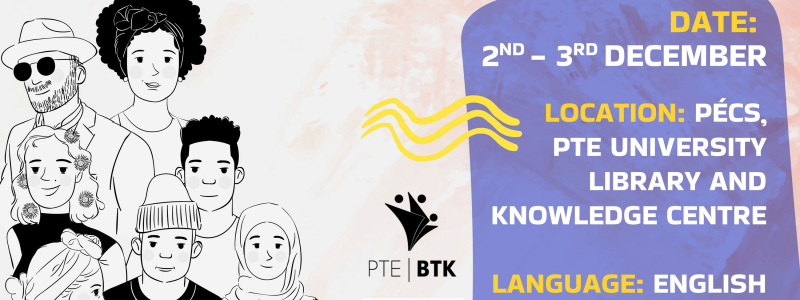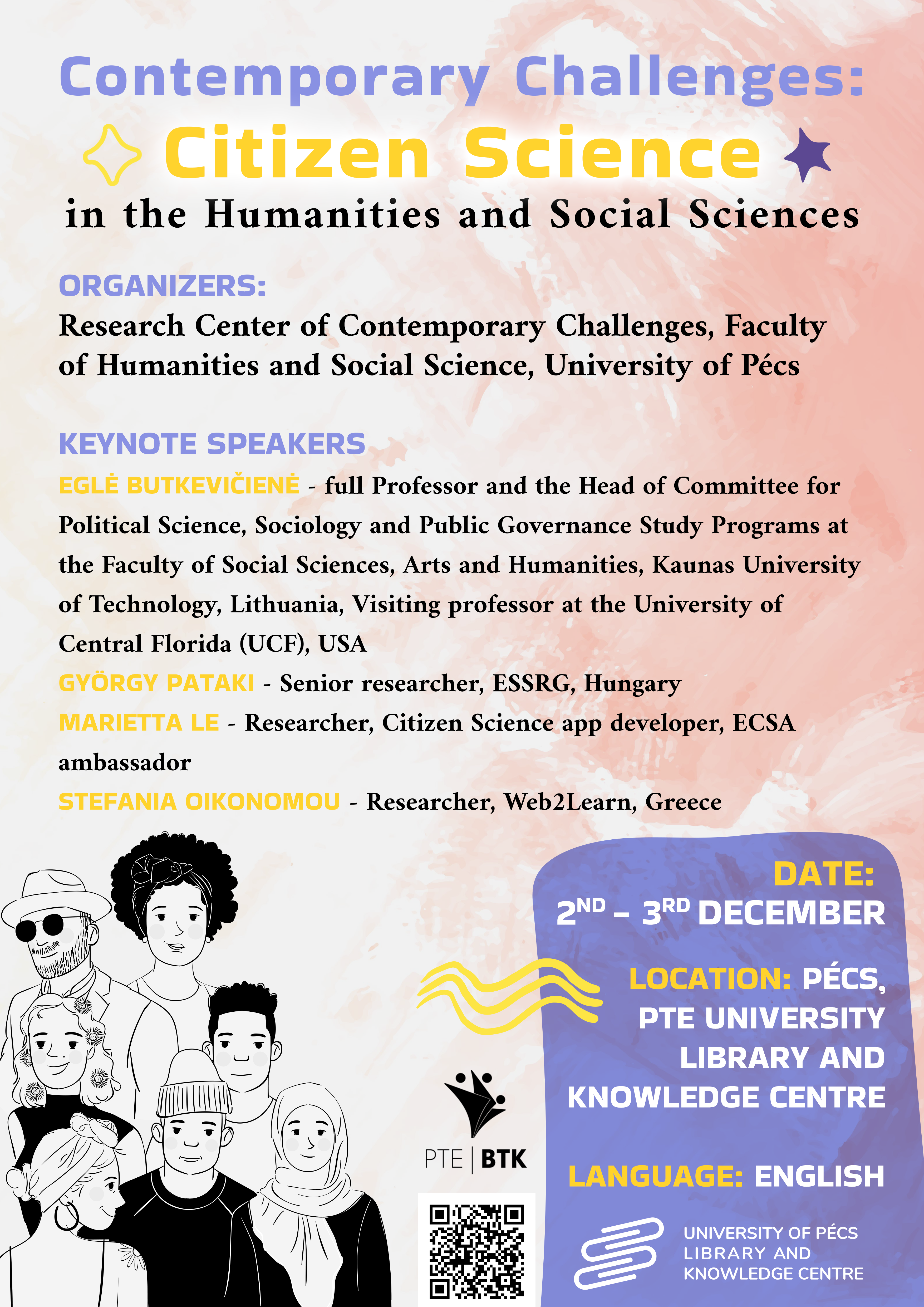Citizen Science in the Humanities and Social Sciences

-
Tudásközpont Pécs
Contemporary Challenges:
Citizen Science in the Humanities and Social Sciences
International Conference organised by
Research Center for Contemporary Challenges
Faculty of Humanities and Social Sciences, University of Pécs
Date: December 2-3, 2024
Location: Pécs, University of Pécs, University Library and Knowledge Centre, Universitas utca 2/A
While most citizen science projects are conducted within the disciplinary frameworks of the natural sciences, the humanities and social sciences also have the potential to achieve valuable results in this area, through their own methodological and theoretical spectrums. This is precisely because their investigations help better understand “the human” (society, culture, and humanity itself), thereby enriching the possible research directions with new approaches and perspectives (see Tauginienė et al. 2020). Recently, numerous interdisciplinary CS projects have been initiated both nationally and internationally within the humanities and social sciences, raising not only new results but also methodological and theoretical questions.
The conference will primarily consider the applicability of CS methods within the humanities and social sciences, exploring the antecedents, challenges, and opportunities of this research paradigm, the boundaries of science, and the crossing of these boundaries. The conference welcomes the presentation of new CS research results and ongoing projects. We also aim to engage in meaningful discussions about the benefits and drawbacks of lay sciences, opportunities for civil-scientific cooperation, and the errors of professional research. For example, in the fields of ethnography and cultural anthropology, there is a long tradition of actively involving laypeople or the subjects of research. Since the inception of ethnography, amateur collectors have had their section within the Hungarian Ethnographic Society. Internationally, public/engaged anthropology or participatory action research is particularly committed to addressing citizens' issues and effectively conveying anthropological knowledge to them. The relationship between the researcher and the researched has been a subject of reflection for decades, with numerous collaborative methods used across various anthropological fields. The boundaries of knowledge have long been debated, often considered permeable and context-specific.
Further topics: The meaning of data differs across disciplines, and different types of data are needed. It is completely different when relying on the principle of statistical representation, assuming that a randomly selected sample allows for extrapolation to the entire population, compared to experimenting with broader interpretations of local phenomena, processes, and structures based on theoretical reproduction. How can different disciplines utilise the results of citizen science, create and examine data, and what types of data are needed?
Considering that interdisciplinarity has a strong tradition in the field of CS sciences, we are also curious about how different disciplines can use and complement each other's results, and how qualitative and quantitative methods can support each other.
Day 1 – Monday – 2nd of December 2024.
12:30 – 13:00 – Registration & Arrival
13:00 – 13:30 – Welcoming speeches & conference program
Judit Farkas (Associate professor, University of Pécs, Hungary)
Beatrix Lábadi (Vice-dean, Faculty of Humanities and Social Sciences, University of Pécs, Hungary)
Alexandra Czeglédi (PhD student, University of Pécs, Researcher, ESSRG, Hungary)
Host of the day: Balázs Arató (Library manager, Benedek Ferenc Library of the Faculties of Law and Economics, University of Pécs, Hungary)
13:30 – 14:00 – Collaboration, participatory data collection and long-term action research in a Hungarian village. The case of Kóspallag
Pál Géza Balogh (Assistant professor, University of Pécs, Hungary)
14:00 – 14:30 – Citizen science and decolonial thinking: A collaborative linguistic ethnographic project for social justice
János Imre Heltai (Associate professor, KRE, Hungary)
Eszter Tarsoly (Associate professor, UCL, UK, Researcher, KRE, Hungary)
14:30 –15:00 – ‘Every citizen is a reporter’ – dilemmas around citizen journalism
Rita Glózer (Associate professor, University of Pécs, Hungary)
15:00 – 15:30 – Enhancing environmental values through experiential learning methods – a participatory study in school gardens
Kármen Czett (Researcher, ESSRG, Hungary)
15:30 – 16:00 – Coffee break
16:00 – 16:30 – The kitchen work of collaborative research: Recipes for emancipatory practices
Luca Sára Bródy (Researcher, HUN-REN KRTK, Hungary)
16:30 – 17:00 – Citizen Science and visual participatory action research
Márton Oblath (Assistant professor, ELTE, Hungary)
Day 2 – Tuesday – 3rd of December 2024.
9:00 – 9:10 – Registration & Arrival
9:10 – 9:20 – Welcome speeches
Judit Farkas (Professor, University of Pécs, Hungary)
Alexandra Czeglédi (PhD student, University of Pécs, Researcher, ESSRG, Hungary)
Host of the day: Alexandra Czeglédi (PhD student, University of Pécs, Researcher, ESSRG,
Hungary)
9:20 – 11:00 – Keynote presentations and Roundtable Discussion on Citizen (Social) Science
9:20 – 9:40 – Reflections on Citizen Social Science As an Emerging Participatory Research Practice: Some Lessons from the “YouCount – Youth Citizen Science” project
György Pataki (Senior researcher, ESSRG, Hungary)
9:40 – 10:00 – The Role of Universities in Building Resilience in Society through Citizen Science
Eglė Butkevičienė (full Professor and the Head of Committee for Political Science, Sociology and Public Governance Study Programs at the Faculty of Social Sciences, Arts and Humanities, Kaunas University of Technology, Lithuania, Visiting professor at the University of Central Florida (UCF), USA).
10:00 – 10:20 – (Re)planning a citizen social science project for and with Deaf and hard-of-hearing individuals
Katerina Zourou (Senior researcher, Web2Learn, Greece)
Stefania Oikonomou (Researcher, Web2Learn, Greece)
10:20 – 10:40 – Citizen Science and ECSA Ambassadors
Marietta Le (Researcher, Citizen Science app developer, ECSA ambassador)
10:40 – 11:00 – Q&A and reflection session with keynote speakers
11:00 – 11:30 – Coffee break
11:30 – 13:00 – 1st session: Citizen science and linguistics
Language matters in citizen science: Participatory hands-on workshop / Nyelvi részvétel a civil tudományban — Műhelyfoglalkozás
Csanád Bodó (Associate professor, ELTE, Hungary)
Petteri Laihonen (Senior Lecturer/HAS Distinguished Guest Researcher, JYU/ELTE, Finland/Hungary)
Gergely Szabó (Assistant professor, KRE; Researcher ELTE/HUN-REN Hungarian Research Centre for Linguistics, Hungary)
13:00 – 14:00 – Lunchtime
14:00 – 15:30 – 2nd session: Citizen Social Science and participatory filmmaking in Siklósbodony
Dominika Ágoston (Young co-researcher, ESSRG, Hungary)
Kovács Melissza (Young co-researcher, ESSRG, Hungary)
Márton Oblath (Assistant professor, ELTE, Hungary)
Rebeka Simon (Co-researcher student, ELTE, Hungary)
Gina Bartáné Somogyi (Co-researcher, ESSRG, Hungary)
15:30 –16:00 – Coffee break
16:00 – 17:30 – 3rd session: Moving away from a citizen science experiment: Agrobiodiversity through participatory research
Borbála Lipka (Researcher, ESSRG, Activist, Magház, Hungary)
The conference is supported by: „Support for scientific conference organization at the Faculty of Humanities and Social Science, University of Pécs, fall semester 2024/25„

Pécsi Tudományegyetem | Kancellária | Informatikai és Innovációs Igazgatóság | Portál csoport - 2020.
